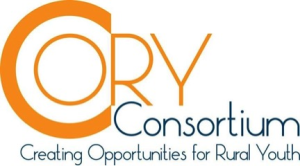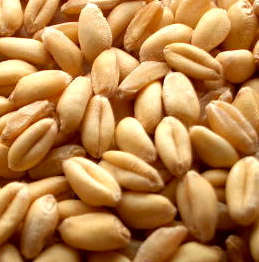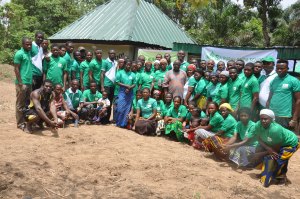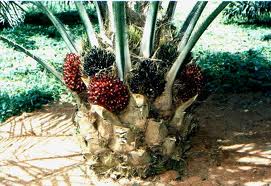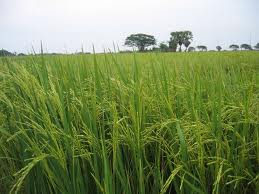15 Feb
YISA Intensifies Efforts in the production of High-yield wheat Foundation Seeds.
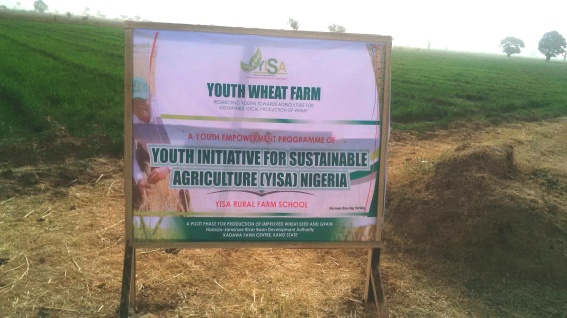
YISA Wheat farm in Kadawa, Kano State
Youth Initiative for Sustainable Agriculture (YISA) Nigeria having identified Wheat production as one of the veritable tool for massive job creation for the unemployed youths is advancing their efforts in the Nigeria Wheat sector.
The Organization received Breeder seeds of the high-yield Norman Bourlag Wheat Variety (with 5-6tons/ha capacity) from the Lake Chad Research Institute (LCRI) for multiplication in the 2015/2016 Dry Season production scheme in Kadawa, Kano State and Bakilori Irrigation Facility in Talata Marfara, Zamfara State.
The Founder/National Coordinator of YISA, Mr. Ogirinye Innocent speaking during the routine Monitoring and Evaluation Visit to the two project sites in Kadawa and Bakilori, Talata marfara reiterates the commitment of the organization to do more if supported by the relevant stake holders. As we may be aware, Dry Season irrigation farming is an expensive venture and we are presently limited by funds to expand our operation in the wheat foundation seeds production that is why we only cultivated 7 hectares of land with Wheat Breeder seed this season. We cultivated 32 hectares last year but due to lack of support, we faced serious on -farm challenges and that is the major reason we reduced the size of the operation this year.
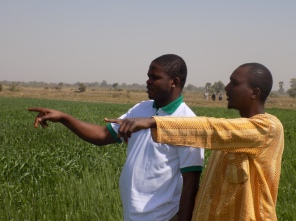
YISA Founder Mr. Ogirinye and YISA Kano State Coordinator: Mudasir Nasir during the M & E visit at Kadawa
Nigeria Government is talking serious on local production of wheat and various policy programmes has been unveiled in support of that; the de-listing of wheat from Forex Platform and the launch of Anchor Borrowers Funds for Dry Season Rice/Wheat Production, we hope to mobilize more youths to produce foundation seeds of these high-yield wheat varieties which will be certified and distributed to wheat farmers in the coming season. We shall be working on 50 hectares in 2016/2017 dry season production with stakeholders support.
We are using our production on the 7 hectares this year as pilot to demonstrate our readiness and commitment and equally have better skills of some salient parameters for successful and sustainable location production of wheat.
“We have already created the partnership platform with the River Basin Operations Directorate of the Federal Ministry of Water Resources which led the allocated hectares of land to YISA by the Hadejia Jama’are River Basin Development Authority and the Sokoto Rima River Basin Development Authority. Lake Chad Research Institute and Wheat Value Chain as well as the Gender and Youth Department of the Federal Ministry of Agriculture and Rural Development are all partners on this our quest and we appreciate their support do far. We shall consolidate on the existing relationship and do better next year” says Mr. Ogirinye as part of the expansion plan.
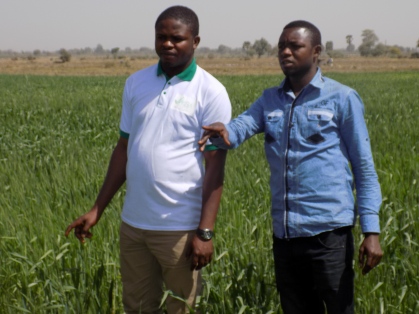
Mr. Ogirinye and Comr. Akpegi Aleje Olimber, the YISA National Director of M & E at the Zamfara Farm Site in Bakilori IP, Talata Marfara.
The Nation Director of M & E Services of YISA Comr. Aleje Akpegi who led the visit team thanked the State Coordinator of Kano Mr. Madusir Nasir and his colleague in Zamfara Sanusi Almustpha for their tireless efforts in managing the farm operations.
15 Feb
YISA benefits from FGN Mechanize Equipment Intervention support to Wheat Farmers
YISA benefits from FGN Mechanize Equipment Intervention support to Wheat Farmers
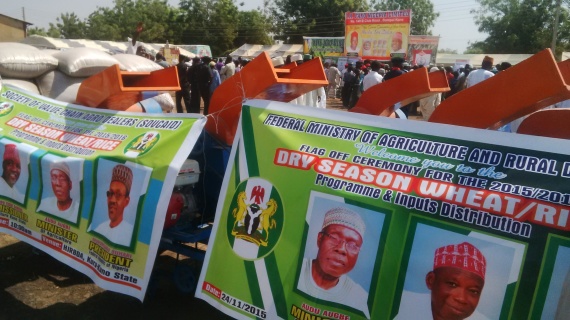 The Youth Initiative for Sustainable Agriculture (YISA) Nigeria, one of the leading youth in Agriculture organizations in Nigeria benefits from Federal Ministry of Agriculture Mechanize Equipment Intervention support for Nigerian Wheat Farmers at a subsidize rate.
The Youth Initiative for Sustainable Agriculture (YISA) Nigeria, one of the leading youth in Agriculture organizations in Nigeria benefits from Federal Ministry of Agriculture Mechanize Equipment Intervention support for Nigerian Wheat Farmers at a subsidize rate.
The Federal Government in her effort to promote local production of Wheat in Nigeria procured Knapsack Sprayers, Water Pumps and Multi-purpose Threshers and distributed them to Wheat Farmers at a subsidize rate to reduce the drudgery association with manual labour in the production activities.
The Equipment were flagged-off by the Honourable Minister of Agriculture and Rural Development, Chief Audu Ogbeh and was supported by the Executive Governor of Kano State; Alh. Abduallahi Umar Ganduje at Kura, Kano State during the official launch of the 2015/2016 Rice/Wheat Dry season Production.

YISA Founder/National Coordinator: Ogirinye Innocent receiving the allocation Paper from the Executive Director, Lake Chad Research Institute (LCRI) Dr. Olabanji Oluwasina while Kano State ATA Director watches
Presenting the allocation paper by the Executive Director, Lake Chad Research Institute (LCRI) Dr. Oluwasina Olanbanji to the Founder and National Coordinator of YISA Mr. Ogirinye Innocent, he challenged YISA to deepen their efforts in the wheat production project ” Let me commend you Mr. Innocent and the YISA team for the efforts you are making in the wheat sector to ensure that we meet 2018 FGN target to reduce wheat importation by 50% , make good use of these equipment to be more productive in your bid to empower young people to get involve in wheat production, because you are the future of this sector and we shall continue to support” said Dr. Olabanji.
Responding, the Founder and National Coordinator of YISA, Mr. Ogirinye Innocent thanked LCRI, the Ministry of Agriculture and particularly Dr. Olabanji for believing in our drive to ensure sustainable local production of wheat . ” Today reminds me of the struggles of last year, when we planted 32 hectares of wheat but couldn’t sustain it to the end due to the drudgery and the expensive nature of dry season production, because we virtually have to foot the bill of the entire process except the 4mt of breeder seeds we got from LCRI. And let me re-assure the FMARD Wheat value chain, we shall do our best to make sure we record more successes in our production this year.
Reacting to NTA interview question from the media Team, Mr. Ogirinye was clear on why he decided to embark on the drive to get young people involve in wheat production ” my brother, how will you reconcile this statistics where Nigeria as a country spend N365Billion importing about 3.5million MT of wheat annually while on the other hand, we have over 600,000 hectares of arable lands that can support wheat production in 13 states of Nigeria but utilizing less than 10% of this endowment to produce barely 250,000mt of wheat, and with over 40 million unemployed youths on the streets, number 1, it doesn’t make sense, 2, that is job exportation, 3 that is poverty promotion among the few wheat farmers, 4, it is unacceptable to us as graduates of Agriculture, 5 it put the sincerity of Nigeria govt determination to create jobs in doubt but thank God, Government is demonstrating it now, CBN has delisted wheat from the Forex platform and went ahead to launch Anchored Borrowers Fund for wheat/rice farmers, this year farmers are supported with mechanize equipment and I am particularly happy to note that among the beneficiaries today are the 13 wheat producing States and YISA.
Our strategy is clear, we want to mobilize young graduates of Agriculture under YISA platform to deepen the partnership with Lake Chad Research Institute to produce Foundation seeds of high-yield wheat varieties to completely phase the era of wheat farmers using “plantable materials (grains)” as seed. That is our entry level because we have the know-how to collaborate with Research Institutes to multiply their breeder seeds if given the needed support to do so and we thank LCRI again for giving us the chance, Mr. Ogirinye Concluded.
31 Jul
YISA PARTNERS WITH CEED TO CREATE OPPORTUNITIES FOR RURAL YOUTHS (CORY)
Background
The Creating Opportunities for Rural Youth (CORY) project is a new initiative that supports young rural women and men in West and Central Africa to become entrepreneurs. Over its 3-year implementation period (2014-2017), the CORY project will focus on rural young women and men, ages 15-35 years, who are involved in agriculture production or activities associated with rural business. The project also targets rural youth institutions for business training, advocacy, networking and knowledge exchange – all with a 1:1 female-male ratio.
By the end of 2017, CORY project will:
- Train 2,880 rural youth agripreneurs and 43,200 farm and non-farm rural youth entrepreneurs,
- Launch 480 rural youth enterprises, and
- Facilitate 2,400 rural youth mentor-entrepreneur pairs.
CORY Project will achieve these outcomes through three main components:
- Knowledge management and research/survey of business development services,
- Provision of rural entrepreneurial training, mentorship, and business development services, and
- Micro-credit lending.
A consortium of organizations called CORY Consortium is managing the implementation of the CORY Project. The CORY Consortium includes:
- Center for Entrepreneurship Education and Development (CEED) in Nova Scotia, Canada ( Grant Recipient)
- Venture For All (VFA), an affiliate of the Columbia Business School in New York, USA
- Susterra, Inc. in Boston, USA,
- Global Youth Innovation Network (GYIN),
- National Implementing Partners (NIPs) in West and Central Africa, and
- Regional Implementing Partners (RIPs) around the world
YISA as National Implementation Partner
YISA and Small Holder Foundation as National Implementing Partners (NIPs) from Nigeria will oversee the implementation of the scheme in Nigeria in close working with the Value Chain Development Programme (VCDP) and Community Based Natural Resource Management Program-Niger Delta (CBNRMP-ND) which are IFAD funded projects in Nigeria.
The selection of the first batch of 150 Youths to be trained on the Columbia Rural Entrepreneurial Venture Creation and Experimental Learning (REVCEL) business Module has been concluded.
Youth Initiative for Sustainable Agriculture (YISA) Nigeria will continue to do our best in our little way to empower Nigerian Youths through Agriculture and look forward to further support from the relevant Institutions like the Youth Employment in Agriculture Programme (YEAP) of the Federal Ministry of Agriculture and Rural Development (FMARD), Bank of Agriculture (BOA), Bank of Industry (BOI) amongst several others to deepen the success of CORY Project in Nigeria were the appeal of the Founder and National Coordinator of YISA Comr. Ogirinye Innocent A.
For More details on CORY, Visit http://coryproject.org/
5 Jun
YISA Partners with Lake Chad Research Institute (LCRI) on Youth Empowerment through Local Production of Wheat.
YISA Partners with Lake Chad Research Institute (LCRI) on Youth Empowerment through Local Production of Wheat.
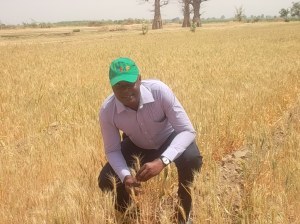
The Deputy National Coordinator and Dir. of YISA Rural Farm School ; Onyeaka Kelechi at the Wheat Farm in Kano
Youth Initiative for Sustainable Agriculture (YISA) Nigeria has expanded its operations to cover additional Six Northern States of Nigeria with a focus on empowering Youths through Local Production of Wheat.
In a Statement by the Founder and National Coordinator of the Organization, Comrade Ogirinye Innocent, He explained that, Nigeria as a country is too rich and blessed with favourable climate for production of most food items, and YISA has yet identify another gap in the north that can be used to empower unemployed Nigeria Youths through Production of Nigerian wheat.
Nigeria as a country spends a whooping some of N635 Billion Naira annually importing wheat into the Country, mean while we have over 600,000 Hectares of land that can support local wheat production in 13 States but is presently using less than 10% of the available land to produce less than 300,000MT of wheat compare to the National demand put at over 3.5Million Metric Tons and on the other hand, over 40 Million Nigeria Youths including graduates of Agriculture are unemployed.
Comrade Innocent Further explained ” I find it irreconcilable that a Blessed Country like Nigeria with over 600,000 hectares of land that can be used to grow “Freshly Nigerian Wheat” is abandoned for N365 Billion Naira spent annually in importation of 3.4Million MT Tons of “very old Wheat grain stored” in some countries and about to be burnt. They are exporting the job meant for the youths.
We are not unware of the challenges that has bedevilled the wheat sector, but we are appealing to the Wheat Millers and all associated interest to please look at the plight of unemployed youths in Nigeria and use their businesses to create jobs for us by patronizing locally grown wheat too. Our concern is not just on what there are importing but we are focused on taking advantage of whatever production gap as Youths to encourage our young people to take up Agriculture as a Business and those products must bought for it to remain business for the youths.
YISA through this partnership with Lake Chad Research Institute(LCRI) and the River Basin Development Authorities has engaged 120 Graduates of Agriculture on a pilot scheme in Bauchi, Jigawa, Kano, Katsina, Kebbi and Zamfara in the production of Foundation seed for the Research Institute. Though we encountered some difficulties last year but there are lessons for greater success this year. LCRI has equally trained the youth beneficiary on sustainable production of Wheat in Kano, in December last Year.
YISA Target is to:
- Cultivate and 13,000ha wheat in 13 states by 2017
- Produce 65,000Mt of wheat in per annum
- Creates 30,000 jobs for the unemployed youths and women by 2017
- Qualify 200 Wheat Extension Service providers to render services to 32,000 Wheat farmers by 2017 in 13 states who will produce additional 160,000Mt.
- Ensure at least 50% annual growth between 2015 -2017 to produce 732,000Mt
YISA is not doing this in isolation but in tandem with the targets of the Federal Government plans to reduce the importation of wheat by 50% in 2017.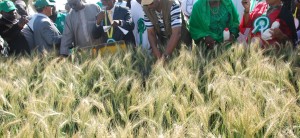
The immediate past Hon. Minister of Agriculture and Rural Development Dr. Akinwumi Adesina (OON) made assertion on the 12th March 2014, while launching two new high-yield,early maturing, heat-tolerant and drought-resistant wheat varieties developed by the Lake Chad Research Institute (LCRI), in conjunction with the International Centre for Agricultural Research in Dry Areas (ICARDA), International Maize and Wheat Improvement Centre (CIMMYT) and Institute for Agricultural Research (IAR), Ahmadu Bello University, Zaria, with assistance from the Federal Government and grant from the African Development Bank (ADB) “In 1987, the Government banned the importation of wheat and implemented an Accelerated Wheat Production Programme aimed at stimulating local production of wheat in Nigeria… Farmers were mobilized to produce wheat and were provided necessary inputs at subsidized rates, and equipment to boost wheat production. The production of wheat expanded from 50,000MT in 1987 to 600,000MT by 1990. Our farmers had proven that they can produce wheat, if well supported. However, several challenges scuttled the burst of energy to produce wheat locally. The introduced varieties had very low yields, as average yield was less than one ton per hectare. But more importantly, the programme failed because of the reluctance of wheat millers in the country to patronize wheat produced locally in the country. With the lifting of the ban in 1990, the programme abruptly ended, and wheat production spiralled downwards to 70,000MT by 1991.
“Today, Nigeria’s wheat import is about 4 million MT per annum and estimated to grow at an alarming rate of 5% per annum. At this rate, the country will be importing 10 million MT of wheatannually by 2030, spending US$15 billion on wheat imports alone.Such over-dependence on imported wheat will pose significant risks to Nigeria’s future growth. Nigeria must grow a lot more of its own wheat and reduce the national, economic and political risks from depending on other nations for our food supply. Today, we are reviving hope for Nigeria to produce its own wheat and free itself from decades of dependence on imported wheat.
“A silent revolution is [now] happening on wheat farms all across Northern Nigeria. The target of the wheat transformation is to increase national production from 300,000 metric tons to about 1.5 million metric tons per annum by 2017. The wheat transformation agenda will generate one million jobs in the rural areas of Nigeria over the next four years of the program and generate over N42 Billion in incomes annually for farmers and millers.
YISA Appreciate the Lake Chad Research Institute, the Wheat Value Chain of the Federal Ministry of Agriculture and Rural Development and the River Basin Development Authorities (Hadejia Jammare and Sokoto Rima River Basins) of the Federal Ministry of Water Resources so far for the support given to the organization.
The particular support of the Executive Director of LCRI, Dr. Olabanji O.G is highly appreciated by the Organization and its teeming youths members.
3 Jun
YISA Trains 100 Youths and Women on Fish Value Chain in Benue State
The Youth Initiative for Sustainable Agriculture (YISA) in their usual style of empowering rural youths and women has trained 100 rural youths and Women on Fish value chain in Umoda-Oju community of Benue State using the Rural Farm School Centre of the organization located in the community.
The training which was captioned: MAKING AGRICULTURE WORKS FOR RURAL YOUTHS AND WOMEN AS BUSINESS is truly set to contribute its quota in reviving rural economy. The training module was particularly focused on Fish Breeding and Modern Processing.
In a statement by the Founder and National Coordinator of YISA, Comr. Ogirinye Innocent, he stated that, what we (YISA) have done is in pursuance of the vision of the organization to create a pool of active players for Sustainable Agriculture, we have trained 78 rural youths and 22 women on fish production and best practiced fish smoking respectively. He further explained that in making agriculture to truly works as Business, we should extend our focus beyond production ” it will be a hallmark of primitive ecosystem to produce for production case, in Agriculture the first answer every agro-entrepreneur should seek in venturing into Agriculture is can I sell what I want to produce?. And in addressing this we decided to train 78 youths both male and female on fish production from fingerling hatchery to table size fish and the 22 women to start from where the youths will stop by smoking and packaging the fish for market. YISA is equally partnering with Magpaty Foods and Agri-Projects Limited in the off-take and marketing of the fish, so it is a start to end project we are doing using the YISA Rural Farm School (YISA-RUFS) Model under the Youth Collaborative Community Agriculture Programme (YOCCAP) of the organization.
The Farm school was started 2 years ago with a seed capital of N1.5Million from United States Agency for International Development (USAID) through the United States Ambassador’s Self Help Project(SSH) and also with tremendous support from the immediate past Honourable Minister of Agriculture and Rural Development(FMARD) Dr. Akinwumi Adesina (OON) through the Gender and Youth Desk. FMARD has remained a greater boaster of the centre. The centre also gives portable water to the community too through our borehole. We maximize our projects for community advancement.
On the plan for the Youths and Women Trainees, the Deputy National Coordinator of YISA and Director of the YISA Rural Farm School Project Comr. Onyeaka Kelechi explained that ” the YISA Rural Farm School Model of the organization is particularly designed to address two key challenges facing most young people in venturing into Agriculture: i.e Lack of appropriate skills for successful Agribusiness and lack of start-up capital. Most youths have the interest in Agriculture but lack the knowledge of how best to do it and eventually got more frustrated by lack of start up capital, YISA RUFs addresses these key challenges by making the farm a school to acquire practical farming skills ‘i.e learning it by doing it and we use the proceed from the sales of the farm produce as equity fund to empower the trainees to set up their own enterprise. All the YISA -RUFS trainees are formed into YISA Farmers Cooperative and we are committed to exploring every legally possible avenue to get them empowered. YISA is also calling other individuals and relevant organizations to come to our aid to deepen the empowerment scheme.
The YISA Rural Farm School Model is already gaining momentum and we hope to receive more support to establish the farm school in all the 36 States. We have partnered with International Fund for Agricultural Development (IFAD) to Set up Bee farm(Honey Production) in Abia State where 15 graduates of Agriculture are presently benefiting, it is also a value chain approach from Production to Processing and packaging, the YISA Tropical Blossom Honey is already in the market. YISA has also partnered with Lake Chad Research Institute (LCRI), the Federal Ministry of Water Resources through the River Basin Development Authority to establish YISA Youth Wheat Farm School in Kano, Jigawa and Bauchi State where 90 Graduates of Agriculture has produced foundation seed on a pilot programme.
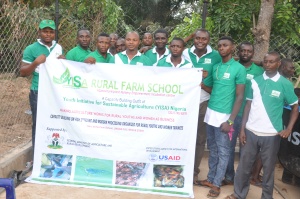 “We are not doing this because we have the monetary resources, but truly the time for hand-outs has passed and investment by the youths in their future signals the sustainable means of job creations. We cannot continue to wait for Government to create all the jobs we need, we cant continue to remain on the street of joblessness as graduates of Agriculture in a country with food import bill of over 1.3 Trillion Naira, we will never ever give up on the dream to lift our peers out of the street of joblessness no matter the challenges” were the closing declaration of Comr. Ogirinye Innocent , the YISA Founder and National Coordinator.
“We are not doing this because we have the monetary resources, but truly the time for hand-outs has passed and investment by the youths in their future signals the sustainable means of job creations. We cannot continue to wait for Government to create all the jobs we need, we cant continue to remain on the street of joblessness as graduates of Agriculture in a country with food import bill of over 1.3 Trillion Naira, we will never ever give up on the dream to lift our peers out of the street of joblessness no matter the challenges” were the closing declaration of Comr. Ogirinye Innocent , the YISA Founder and National Coordinator.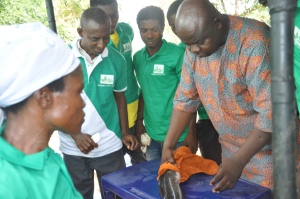
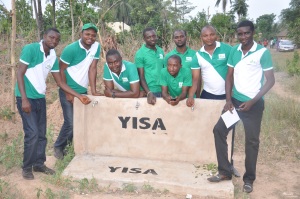
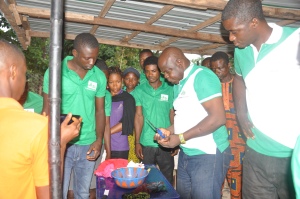
3 Jun
YOUTH INITIATIVE FOR SUSTAINABLE AGRICULTURE PARTNERS WITH U.S. GOVERNMENT ON COMMUNITY EMPOWERMENT SCHEME THROUGH AGRICULTURE.
The Youth Collaborative Community Agriculture Programme (YOCCAP) of the Youth Initiative for Sustainable Agriculture (YISA) Nigeria, received a support from the Government of United States through the U.S. Ambassador’s Self Help Project for a community empowerment scheme in Umoda- Oju Community of Benue State.
Signing the Grant award documents on Friday, 31st May 2013 with the United State of America’s Ambassador to Nigeria, Amb. Terrence P. McCulley, the Initiator and National Coordinator of YISA, Comrade Ogirinye Innocent Adoga, explained that the grant is a major boost to the Organization’s commitment towards ensuring that unemployed community youths and women are given life inherent in socio-economic independence.
The Grant will be used to set-up a Community Agricultural Skills Acquisition Center.
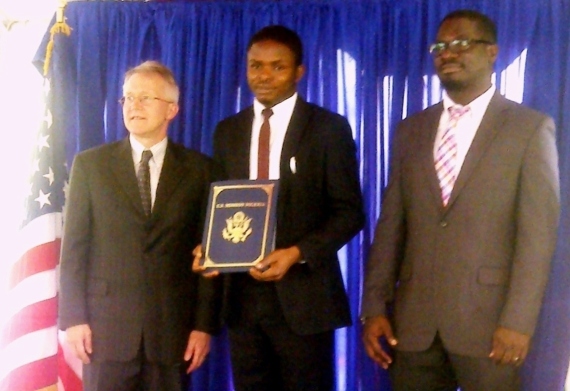
United States of America’s Ambassador to Nigeria, Amb. Terrence P. McCulley, YISA Initiator/National Coordinator , Comrade Ogirinye Innocent and Mr. Effiom Vincent, Coordinator Ambassador’s Self Help Project.
”Specifically we are setting a up Fish demonstration Farm, designed to train Thirty-Five (35) unemployed Youths and Fifteen (15) Rural women in Fish production and Best practice Fish smoking and Packaging. The Fifty(50) first Stage beneficiaries will be adequately trained and empowered to start their own fish farm. Though the grant is more like a seed capital but we shall leverage on it to solicit for more assistance to ensure that the project is expanded; we shall plant the seed and ensure that it is properly watered to produce branches and multiple fruits. The Fish Project is just one component out of the Nine (9) components of the YOCCAP.” Were the declarations of the YISA National Coordinator.
He further went on, “The trainees will be formed into YISA Youth Fish Farmers Cooperative and the Cooperative tool shall be explored using every possible avenue to ensure that the trainees are properly empowered. We understand the passion and commitment of Dr. Akinwumi Adesina, the Honourable Minister of Agriculture and Rural Development to turn around agriculture in Nigeria through the President Goodluck Ebele Jonathan’s Transformation Agenda which has special packages for Youths and women especially the rural dwellers with little or no access to job opportunities to earn a livelihood. This is our own way of contributing to the Transformation Agenda and we believe strongly the short comings of the project will be augmented at the appropriate time from other renounced corporate entities with genuine desire to empower Youth and Women. He has earlier trained five (5) Youths on Poultry farming using his small-scale Poultry Farm(MagPaty Farms) located in the Community.
The YOCCAP of YISA is designed to address the problem of Youths’ lack of Interest in Agriculture, lack of access to land and other farm inputs, start-up capital and appropriate skills required for Sustainable Agricultural practices. The Collaboration will ensure that all production costs are shared and economics of scale is taken advantage of towards ensuring profitable Agro-enterprise.
The Ministry of Agriculture under Dr. Adesina is treating Agriculture as a business and has developed programmes to sustain the initiative. However he urged the Government to do more on information dissemination/awareness programme to enable Young people and existing farmers to know about programmse and participate for enhance Agricultural productivity.

Comrade Ogirinye Addressing the press
20 May
YOUTH AGRICULTURAL RE-ORIENTATION IS KEY TO ACHIEVING THE FEDERAL GOVERNMENT AGRICULTURAL TRANSFORMATION AGENDA (ATA).
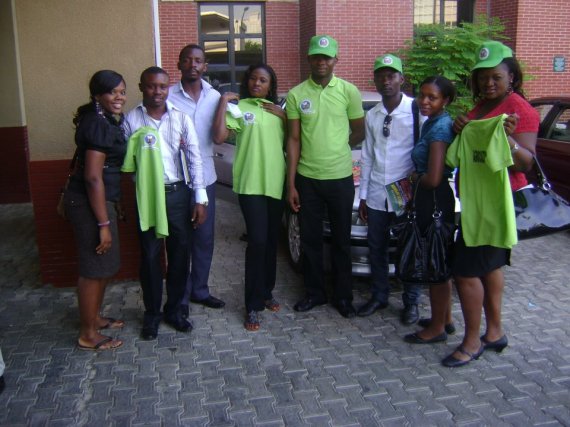
NATIONAL COORDINATOR OF YISA (5TH FROM LEFT) AND SOME YOUTHS AFTER AN AGRIC. RE-ORIENTATION WORKSHOP
YOUTH AGRICULTURAL RE-ORIENTATION IS KEY TO ACHIEVING THE FEDERAL GOVERNMENT AGRICULTURAL TRANSFORMATION AGENDA (ATA). There is a radical shift in the Nigeria agricultural sector today, with the assumption of duty by a dynamic, visionary and highly experienced agriculturist and fine gentle man as the Honourable Minister of Agriculture and Rural Development, the sector has been over hauled, the areas of dislocations has been identified and in fixing the broken links, he has adopted the Value Chain Approach that promotes the sector from a primitive developmental vocation meant for the rural peasant entrapped in a vicious cycle of poverty, who has to farm to be able feed to a lucrative agribusiness enterprise that can take millions of unemployed youths off the street. Dr. Adesina was not ashamed to announce to the world Nigeria’s challenges in terms of food production as a nation. It was reported that Nigeria spent N98, 000,000,000,000 on food importation between 2007- 2010. This amount, which is about 19 times our national annual budget, was spent importing food products that can readily be produced in Nigeria such as Fish, Wheat, Rice, Sugar, and Tomato among several others. From River Benue to River Niger down to the confluence of Lokoja in Kogi was not considered enough blessings from God to be explored for Fish production, while the N97, 000,000,000 spent on fish importation within those years be alternatively used to empower our jobless youths to produce same fish with a view to reducing unemployment and restive activities. We have 61 million hectare of arable land yet only about 30million hectare is been cultivated but our youths seem not to know the gap that exist that could reward their participation. The Agriculture Ministry has put in place innovative solutions to addressing our unemployment and food security challenges. But are Nigerian youths aware of the goldmine Dr. Adesina Akinwumi has hidden in the Agricultural sector today? Four major problems among several others accounted largely for youth’s lack of interest in Agriculture, namely: i. Drudgery in farm operations ii. Lack of competitive market for Agricultural products iii. Lack of start-up capital for the youths. iv. Lack of Buy Back Scheme (BBC) from the Government However, the ATA team is working very hard to address all these problems through the following Government Initiatives that are mostly Private sector driven but Government enabled. Some of the programmes include: • The Private Sector Driven Agricultural Mechanization Programme, (PSDAMP) • Staple Crops Processing Zones (SCPZs), • One Stop Agro-Centre (OSAC), • Youth Employment in Agriculture Programme (YEAP), • Growth Enhancement Support (GES) Scheme, • Nigeria Incentive Based Risk sharing System for Agricultural Lending (NIRSAL), • Commercial Agriculture Development Project (CADP) • FADAMA III, • National Programme for Food Security (NPFS), • Private sector Driven Commodity Marketing Corporation • Among several others. In complementing the efforts of the Government, Youth Initiative for Sustainable Agriculture (YISA) has Embarked on Youth Agricultural Re-orientation workshop to educate Nigerian youths that Agriculture is pure business, it plays a critical role in the National food and social security, and holds a lot of prospects for Business oriented individuals who can seize the opportunities created by some of the programmes mentioned above to better their lots. YISA do not merely encourage youth to take up Agriculture as a business but creates a platform for active participation through the organization’s Youth Collaborative Community Agriculture Programme (YOCCAP). Check http://www.fmard.org for other details By Comrade Ogirinye Innocent A.
14 Mar
GROWING OIL PALM
Growing Palm Oil
Published May 5, 2012 | By Agricbusiness
1. Technical aspects of oil palm :
Oil Palm (Elaeis guinensis Jacq.) is a native of Guinea Coast of West Africa. It belongs to family Palmae and tribe Cocoineae. Oil palm is the highest oil producer among perennial oil yielding crops. It produces two distinct oils viz., palm oil (extracted from meso carp of fresh fruits) and palm kernel oil (from kernel). Palm oil has excellent health attributes. It is rich in vitamins A and E and is cholesterol free. Palm oil can be used in formulation of margarine and cooking fat such as vanaspathi. It can be used in manufacture of biscuits, ice creams, soaps, detergents, and shampoos and also as frying fat. Palm kernel oil has variety of industrial uses.
1.1 Varieties: Broadly, there are three varieties viz., Dura, Piscifera and Tenera. Tenera, a hybrid of Dura and Piscifera is characterized by a thin shell and medium to high mesocarp (65-90%) and high oil content (16-20%). It is a commercially cultivated variety.
1.2 Soil and climatic requirements: Deep well-drained medium loam soil, rich in humus is the most suit
able for oil palm cultivation. Oil palm requires a well distributed rainfall of 2500 to 4000 mm per annum and a temperature ran
ge of 19-33° C. It is a water-loving crop and it requires adequate irrigation. The crop responds well to drip irrigation and yields are reported to increase by at least 20%.
1.3 Planting: Oil palm is planted in triangular system at a spacing of 9 X 9 X 9 m accommodating 143 plants in a hectare. Planting can be done in any season. However, the best period is June to December. Seedlings of 10-14 months age are best suited for planting.
1.4 Irrigation : Oil palm requires adequate irrigation, as it is a fast growing crop with high productivity and biomass production. For yielding palms of above three years age, a minimum of 150 litres per day is required. In older plantations the requirement goes upto 20 litres per day.
The crop responds well to drip or micro sprinkler irrigation p
articularly when water is limited. If drip is installed four drippers have to be placed for each palm. If each dripper discharges 8 litre per
hour, 4-5 hour of irrigation is sufficient to discharge 160 litre per day. Drip irrigation increases the productivity by 15-20 per cent, red
uces wastage of water, and requires less power/fuel per irrigation compared to conventional irrigation methods. It is important to note that any physiological stress shifts sex ratio in favour of male flowers and consequently the productivity is reduced.
1.5 Nutrition: Fertilizers are preferably applied in 3-4 split doses.
Application of green leaf manure or compost is advantageous, especially where the soils are poor in organic matter.
1.6 Inter crop: During the initial stages of plantation in oil palm i.e., upto 3rd year, some of the light feeder inter crops such as pulses, cereals, vegetables, grasses etc., can be grown. Inter crop should be grown 1 m. away from the basin in 1st year of oil palm plantation. In two-year-old plantations, it should be grown 2 m away, followed by 3 m in the third year plantations.
1.7 Yield : Oil palm starts bearing from 4th year onwards and its economic life varies from 30 to 35 years. The yield of oil palm varies according to age and management. Under average management cond
itions in a mature plantation (8 to 9 years old), yield of 15-18 tonnes of fresh fruit bunches (FFBs) per hectare is expected. Under good maintenance and management, yield upto 25-30 tonnes of FFBs per hectare is possible.
18 Dec
FG TO BOOST RICE PRODUCTION IN 10 STATES
The Federal Government has inaugurated a special intervention programme aimed at boosting rice production in ten states of the federation, an effort which it said, would astronomically scale up rice production in 2013.
The intervention was unveiled shortly after the Food and Agriculture Organisation (FAO) acknowledged the increased rice output in Nigeria and Ghana and that the global rice production for 2012 “will outpace consumption in 2012/13, resulting in an upward revision of five million tonnes in 2013 closing inventories”.
But in a statement, Minister of Agriculture and Rural Development, Dr. Akinwumi Adesina, promised that the Federal Government would not rest on its oars until its targets for self-sufficiency in rice production was achieved.
He said the launch of a special intervention programme on dry season paddy production plan was also in 10 states of the federation including Kebbi, Zamfara, Kano, Jigawa, Sokoto, Katsina, Bauchi, Gombe and Kogi.
He explained the criteria for choosing the states, which he said, include existing culture of dry season rice paddy production, availability of water either from irrigation project or bore hole and strong state government support for the programme.
He added that about 159, 860 farmers “have enrolled into the programme and will plan 16, 731 metric tonnes of high quality seed on 334, 204 hectares of land, to be supported with 33, 420 metric tonnes of fertiliser.
“Fertilizer will be available at designated agro-dealers in each local government area. Registered farmers will receive two bags of fertilizer at 50 percent subsidy and are free to buy the remaining quantity of fertilizer to make up for optimum fertilizer recommendation per hectare at market prices from the agro-dealers”.
On seeds, the minister said a special arrangement had been made with the agro-dealers who handle fertilizers “to be the redemption centers for seeds. Each farmer will be entitled to 50 kg of seeds of improved rice varieties, enough to plant one hectare of land. The seeds will be provided free of charge while there will be enough seeds at cost price for farmers who intend to plant over one hectare of land.
“To abate possible water shortages at the peak of dry season, each state will be assisted with 250 water pumps and accessories. 2, 000 water pumps are being deployed for this exercise. To keep the paddy clean during threshing, provision will also be made for farmers to have access to 5 square meters of tarpaulin. A service provider will be attached to each State to supply the material at a discount,” he noted.
In its recent report, the FAO said that the world rice carryover stocks “are expected to rise by 7 per cent, or 10 million tonnes, to a new high of almost 170 tonnes, marking the eighth consecutive year of stock accumulation. As a result, the world rice stock-to-use ratio is forecast to rise from 33.6 per cent in 2012 to 35.5 per cent in 2013.”
The report said a significant achievement of the rice transformation agenda “is the creation of awareness of the investment opportunities in the rice sub-sector. Large rice farms are springing up across the federation with many having their own mills and clusters of out growers. Today, we have 14 integrated mills operating fully by the private sector. Another 11 large mills are under installation or rehabilitation and are expected to come under full operation by March 2013”.
10 Dec
Adesina is the Best Agric Minister Ever, Say Graduates
200412N.Akinwumi-Adesina.jpg – 200412N.Akinwumi-Adesina.jpg
Minister for Agriculture and Rural Development, Dr. Akinwumi Adesina
The Minister for Agriculture and Rural Development, Dr. Akinwumi Adesina, has been described as the best person ever to occupy the seat since the ministry was established.
This was the conclusion of a cross section of participants who graduated last Friday, from the four-week agribusiness training conducted by Federal College of Animal Health and Production Technology, Ibadan, Oyo State.
Over 250 entrepreneurs participated in the training programme on fisheries and poultry. The curriculum included production, marketing, processing, agribusiness and getting access to finance.
At the end of the course, each of the 90 graduates in the fisheries programme got 400 fingerlings and feeds to nurture the fingerlings for four months, free of charge.
About 140 people graduated in the poultry course. Each of them received, free of charge, 100 day-old chicks and feeds for three months.
One of the participants, Alhaji Owolabi Idris, praised Adesina for the programme: “only God can reward him. I thought it was a mere play until I got here. We were taken through rigorous theory and practical classes.
“Those who performed below 75 per cent were dropped. The minister has thought me how to fish, and has given me fishes for me to go and multiply, he is the best in the history of Nigeria.”
Madam Mojisola Ariyo, who took part in the poultry course remarked thus: “ I have never seen a thing like this before: I came here for the four-week training. They gave us accommodation, they gave me 100 chicks, three months feeds to feed them to the point of laying and N5, 000 to transport them home, it is as if I am still dreaming.”
Another participant, Mr Rashidi Odunaiya, however, pleaded with the government to continue the programme: “I want government to continue. A lot of people here are entrepreneurs and retired people. The government should continue and also find a way of encouraging the youths to show more interests,” he said.
Afolake Mabadeje, who took the training course on fisheries was full of joy as she received her fingerlings, feeds and transport fare in Ibadan last Friday. In her words: “I am too happy to talk now because I don’t want to start crying. My creator will help me bless these people and the minister. They have given me what I will eat, God bless them.”
In his remarks, the Head of Department, Department of Vocational Training and Senior lecturer in Animal Production at the college, Dr. Adekoya Owosibo, remarked that the training was part of government efforts in the Agricultural Transformation Agenda (ATA), “to empower many people; unemployed youths, women, peasant farmers, and military and civilian retirees for self-sustenance, economic independence, job and wealth creation.”
Tags: News, Nigeria, Featured, ADESINA, Agric, Minister, Graduates
30 Nov
YES WE CAN REVOLUTIONIZE NIGERIA AGRICULTURE
The greatest and most inspiring mountain climbing achievements in history are not so much stories of individual achievement, but are stories of the Extraordinary power of a unified, talented, prepared team that stays loyally committed to one another and to their shared vision to the end. Lets build this bridge together and together we shall stand all tall against all odds and ends this aimless search for white cola job in Nigeria. AGRICULTURE HOLDS THE TRUE KEY TO OUR NATIONAL WEALTH.
The 21st Century Agricultural challenges of our dear Country Nigeria cannot be solved by the 15th Century farming practices employs by the present crop of aging and aged farmers whose best implement are hand hoes and cutlasses. -ogirinye Innocent
Nigeria Agricultural graduates can not continue to defy the essence of education which is meant to be a tool to be used to free our people from primitiveness by fleeing away from the primitiveness of our Agriculture. we must use our education to mechanize Nigeria Agriculture by ushering in a true era of sustainable Agriculture. -ogirinye Innocent
28 Nov
YOUTH EMPLOYMENT IN AGRICULTURE PROGRAMME (YEAP)
ACHIEVING YOUTH EMPLOYMENT FOR NAGROPRENUERS: THE 21ST CENTURY APPROACH BY A 21ST CENTURY DYNAMIC AGRICULTURE MINISTER. BY COMRADE OGIRINYE INNOCENT 08077686333.

L-R DR. EZEKIEL ONYEMOMI (Permanent Secretary), DR. ADESINA AKINWUMI (Hon. Minister) and DR. BUKAR TIJANI (Hon. Minister of State) of the Federal Ministry of Agriculture and Rural Development, Abuja.
It was a historic moment that marks the end of the old bureaucracy; it signifies the redefinition of a path in our National history as well as the beginning of a new chapter for teeming Nigerian Youths in Agricultural sector. On Thursday the 20th to Friday the 21st September 2012 witnessed the gathering of over a hundred stakeholders from different academic and professional background who converged at the instance of the Federal Ministry of Agriculture and Rural Development, Abuja for a Technical workshop for the Design of the Presidential Initiative for Youth Employment in Agriculture with a caption: ACHIEVING YOUTH EMPLOYMENT FOR NAGROPRENUERS. The participants at this event were mostly Nigerian Youths cutting across diverse professions especially those from the Agricultural discipline to say what they want and in what best format they want it. It was indeed a programme of the Youth, for the youth and by the youth as the young participants under the guidance of few older stakeholders in the sector (who were there to sharpened their ideals for sustainability) suggested how best their lack of interest in Agriculture can be revived and sustained. The identified problems militating against Youth participation in Agriculture along which the thematic session for the workshop were formed was not designed by the Ministry, it was done by some few Youth leaders who formed the National Steering Committee for the Youth Employment in Agriculture Programme (YEAP), this I was opportune to be a member and which was set up devoid of politics.
This is the first time in our recent past that the Beneficiaries of a policy were given the chance to say what their challenges are and how best the problems can be solved with a keen interest from the man who holds the pen.
The Honourable Minister of Agriculture, the Minister of State for Agriculture, the Permanent Secretary and several other top functionaries in the Agricultural sector were among the audience listening to the young dynamic, creative and innovative Nigerian Youths present the ideal solutions to their problems as rightly identified by their colleagues at the Steering Committee. What a show of humility, passion for result, and I dare ask: how many Ministers today will take their seat at the back and see the younger ones suggest to them what they want and how they want it?
I saw at the extreme end of the audience seats, two dynamic 21st century Ministers of Agriculture, with a 21st century bureaucracy to address the 21st century challenges of Nigeria using their sector.
The Honourable Minister of Agriculture in his opening and closing remarks reiterated his commitment to achieving the Agricultural Transformation Agenda, he emphasized that the era of old age farmers need to be over, that subsistence agriculture has to give way to youth driven commercial Agriculture and our hard Naira currency use on food importation has to be redistributed among our farmers, enough is enough for the continue stay of our youth on the street of joblessness while we keep the youths of the countries where we do our food import out of street. To him the time for the over haul of Nigeria Agriculture can not be better than now and Agriculture must be treated as business and no more a developmental project.
In his speech and actions, I see a passionate commitment to achieve results instead of the usual politics, behind a smile of fine gentle man, I see hope for Nigerian youths, I see a future for Agricultural graduates to be proud of their profession again, to say to the entire world I am a NAGROPRENEURE. He is a stakeholder whose voice represents the voices and language of the Youths. The aspirations of new Nigeria where food security and Youth employment will be guarantee through Agriculture. To many fellow youths that I interacted with at the workshop he is an inspiration to them, he drives the vision of Youth Initiative for Sustainable Agriculture (YISA), my dream and to me a role model.
Among several solutions suggested by the youths ranging from Improved Access to land, Credits, Educational support for future Agricultural Scientist, Youth farm Rehabilitation, Include youth in Input Production, Research and Development, Rural Infrastructure, the Improved Access to land thematic session advocates for Retirement Age from the Farm Cities to be set up to pave way for continues youth participation in Farming.
The workshop was not just an opportunity for youths to say what they want, it was also an opportunity for Youth –In – Agriculture and other related Organizations and individuals to share their experiences, ideals and networked for other mutual and enhanced participation in the Agricultural value chain. Youth Initiative for Sustainable Agriculture (YISA) was not left out in the entire process.
13 Dec
Agricultural Opportunities – Join YISA today.
HOT AGRICULTURAL JOB OPPORTUNITIES (VACANCIES).
Are you a graduate of agricultural discipline, passionate and committed to pursuing a course that will ensure food security in Nigeria; are you looking beyond job security to ensure a financial security for yourself; do you believe in the power of unity, collectivity, shared ideals and experience; are you passionate about contributing your quota towards sustainable agriculture in Nigeria; do you believe that the 21st century Agricultural challenges of our dear nation requires the solution of young energetic and well-educated team of young agro-professionals; are you interested in agriculture and funds is your challenge; are you between the ages of 18 to 40 years? if your answer to any of these questions is yes, then Youths Initiative for Sustainable Agriculture(YISA), Nigeria is a place for you. send in your application for membership to yisanigeria@gmail.com indicating your course of study and present location as the subject of the email on or before January 30th 2012.
YISA IN BRIEF (www.yarinigeria.wordpress.com)
Youths Initiative for Sustainable Agriculture is a Non Government Organization, with Local, State, National and International recognition, as an agricultural knowledge based group of agro professionals and other youths interested in agriculture, promoting sustainable agriculture and providing knowledge to the present and next generation of agricultural producers by sourcing and refocusing resources on youths’ development needs through agriculture. We are redirecting youths towards sustainable agriculture through our on-farm and off-farm activities in the globalized world. Helping to take agricultural graduates off the street of job search, providing food and employment opportunities while alleviating rural poverty and ensuring development…………………………………..
13 Dec
Sustainable Agriculture – Innocent Adoga
WHAT IS SUSTAINABLE AGRICULTURE?
Sustainable agriculture integrates three main goals–environmental health, economic profitability, and social and economic equity. A variety of philosophies, policies and practices have contributed to these goals. People in many different capacities, from farmers to consumers, have shared this vision and contributed to it. Despite the diversity of people and perspectives, the following themes commonly weave through definitions of sustainable agriculture.
Sustainability rests on the principle that we must meet the needs of the present without compromising the ability of future generations to meet their own needs. Therefore,stewardship of both natural and human resources is of prime importance. Stewardship of human resources includes consideration of social responsibilities such as working and living conditions of laborers, the needs of rural communities, and consumer health and safety both in the present and the future. Stewardship of land and natural resources involves maintaining or enhancing this vital resource base for the long-term.
22 Oct
Global Warming: Meaning, Effects and Solution – Anunobi Sunday Fred
Global warming is when the earth heats up (the temperature rises) and it happens when green house gases such as Carbon dioxide (CO2), water vapour, Nitrous Oxide and Methane (CH4) trap heat and light from the sun in the earths atmosphere which increases the temperature.
Global warming can also be defined as continuing rise in the average temperature of the earth’s atmosphere and oceans. Global warming is caused by increased concentrations of green house gases in the atmosphere resulting from human activities such as deforestation and burning of fossil fuels. In order words, global warming is the increase of the earth’s average surface temperature due to effect of Green house Gases such as CO2, emission from burning fossil fuel or from deforestation which traps heat that would otherwise escape from earth. This is a type of Green House Effect. This hurts many people, animals and plants. Many cannot take the change so they die.
What is Green House Effect?
The Greenhouse Effect is when the temperature rise because of the sun’s heat and light is trapped in the earth’s atmosphere. This is like when heat is trapped in the car. On a very hot day, the car gets hotter when it is out in the parking lot. This is because the heat and light from the sun can get into the car by going through the windows but it cannot get back out. This is what the green house effect does to the earth. The heat and light can get through the atmosphere, but it can’t get out. As a result the temperature rises.
The sun’s heat can get into the car through the window but is then trapped. This makes what ever the place might be a green house, a car, a building or the earth’s atmosphere hotter. Once the light from the sun gets inside the car for instance, it is trapped and the heat builds up, just like it does in the earths’ atmosphere.
The green house effect makes the earth appropriate for people to live on. Without it the earth would be freezing or on the other hand it would be burning hot. It would freeze at night because the sun would be down.
Although the green house effect makes the earth able to have people living on it, if there gets to be too many gases, the earth can get unusually warmer and many plants, animals and people will die. They would die because there would be less food (plants like corn, wheat and other vegetables and fruits). This would cause us to have less food to eat, but it would also limit the food that animals have, with less food like grass, for animals that we need to survive (this would happen because the plants would not be able to take the heat.) we would even have less food. Gradually people, plants, animals would die of hunger.
What are Green House Grasses?
Green house grasses are gases in the earths’ atmosphere that collects heat and light from the sun. With too many Green house grasses in the air, the earths’ atmosphere will trap too much heat and the earth will get too hot. As a result people and animals would die because heat would be too strong.
What is Global Warming doing to the Environment?
Global Warming is affecting many parts of the world. Global warming makes the sea rise and when the sea rises, the water covers many lowland islands. This is a problem for many plants, animals and people on islands. The water causes some of the plants to die. When they die the animals lose their sources of food along with their habitat.
The ocean are affected by global warming in other ways as well, many things that are happening to the ocean are linked to global warming. One thing that is happening is warm water cause from global warming and is harming and killing algae and ocean.
Algae are a producer that you can see floating on the top of the water. A producer is something that makes food for other animals through photosynthesis, like grass. These floating green algae are food to many consumers in the ocean. A consumer is something that eats the producers e.g. the small fish, crabs, some whales etc. Global Warming is also killing algae but it is also destroying many huge forests. The pollution that causes Global Warming is linked to acid rain.
Global Warming is also causing many more fires that wipe out whole forests. This happens because global warming makes the earth very hot. Some plants and tree leaves can be so dry that they catch on fire easily.
Causes of Global Warming
Many things cause global warming. One thing that causes global warming is electrical pollution. Electricity causes pollution in many ways. In most cases fossil fuels are burned to create electricity. Fossil fuels are made from dead plants and animals. Some examples of fossil fuel are oil and petroleum. Many pollutants (chemicals that pollute the air, water bodies and land) are sent into the air when fossil fuels once burned. Some of these chemicals are called green house gases.
Some other examples of using energy that results in pollution of the air are.
v Turning on a light
v Watching T.V
v Listening to a stereo
v Washing or drying cloths
v Using a hair dryer
v Riding in a car
v Heating a meal in the micro wave
v Using an air conditioner
v Playing a video game
v Using a dish washer
When you do these things you are causing more greenhouse gases to be sent into the air.
Another thing that makes global warning worse is when people cut down trees. Trees and other plants collect CO2, which is green house gas.
What are people doing to stop Global Warning?
People are doing many things to stop global warning. One thing people are doing is car-pooling. Car-pooling is driving with someone to a place that you are both going. This minimizes the amount of greenhouse gases put into the air by a car. Another thing people are doing is being more careful about leaving things turned on like T.V, computer and lights.
What is Government doing to stop Global Warming?
The Government made the law called the Clean Air Act so there is less air pollution. Global Warming is making people get very bad illness that could make them disables, very sick and sometimes even die. The Clean Air Act is making many companies change their products to decrease these problems. The Clean Air Act has also made car companies change some of the things inside of the cars. Cars pollute a lot while cars make more than half of the world’s smog (visible pollution in the air). Many things that cars need to move and heat up make even more pollution. Cars, buses and trucks are also responsible for over 50% of dangerous chemicals let into the air some of these chemicals can cause cancer, birth defects, trouble breathing brain and nerve damage, lung injuries and burning eyes. Some of the pollutants are so harmful that they can even cause death.
There is also the Kyoto Protocol which mandates partner governments to cut down on their CO2 emissions. Another mechanism employed to cut global CO2 emissions is the Carbond Development Mechanism (CDM). Countries are now exploring alternative and renewable energy sources that are more climate friendly like bio-fuels, solar energy, tidal energy among others.
Normal
0
false
false
false
EN-US
X-NONE
X-NONE
/* Style Definitions */
table.MsoNormalTable
{mso-style-name:”Table Normal”;
mso-tstyle-rowband-size:0;
mso-tstyle-colband-size:0;
mso-style-noshow:yes;
mso-style-priority:99;
mso-style-parent:””;
mso-padding-alt:0in 5.4pt 0in 5.4pt;
mso-para-margin:0in;
mso-para-margin-bottom:.0001pt;
mso-pagination:widow-orphan;
font-size:10.0pt;
font-family:”Times New Roman”,”serif”;}
Global Warming is affecting many parts of the world. Global Warming makes the sea rise and when the sea rises, the water covers many low land Islands. This is a problem for many plants, animals and people on Islands. The water cause the plants and cause some of them to die. When they die, the animals lost a source of food, along with their habitat.
21 Oct
Propose a Business Plan and Get Up to N10 Million Funding
The Federal Government of Nigeria has launched an innovative program aimed at empowering youths to become entrepreneurs in various fields of endeavor. The project is tagged YouWiN. Youths are expected to propose a business plan and if they are selected winners, the could get funding up to the tune of N10 million. For us, this is an opportunity to propose an agricultural business plan and get funding to execute projects. This will not only empower us but also make us employers of labor. While your proposals can be in any sector I like to think the agricultural sector provides us with a myriad of opportunities that are not only viable in implementation but also profitable. Since winners will be selected from the 6 geo-political zones of the country I would say agricultural business plans stand a good chance of winning…if you are convincing enough that is. You can explore business plans in poultry, fish farming, crop production, range management, agricultural food processing and value addition, integrated agricultural projects among others.
Nigeria still imports several of the materials used in various industrial production phases in the country. Ironically many of these imported materials like margarine for one, used in bread production are agricultural derivatives. Now I am not selling you all my ideas but how about we begin to think in such light? How about we develop a business line to supply all the margarine the country needs, or all the starch from cassava or all the fish feeds that we currently import a large chunk off? How about we design a business plan aimed at stopping rice importation or that of beans, my favorite food for that matter? The opportunities are inexhaustible for one looking at the agricultural sector…take your time, make your pick but the deadline is creeping so ACT NOW!!! Below is a summary of the YouWIN project which can also be found at the website.
Welcome to YouWiN!
YouWiN! stands for Youth Enterprise with Innovation in Nigeria. It is an innovative business plan competition aimed at job creation by encouraging and supporting aspiring entrepreneurial youth in Nigeria to develop and execute business ideas.
Timelines for the Competition
All applicants should take note of the following critical dates for this competition:
1. First round business concept submission closes on Friday November 4, 2011. No entries will be accepted after that date
2. Notification of second round candidates and invitation for zonal training will be on a rolling basis as entries are received and evaluated, and will be completed by Saturday November 12, 2011.
3. Training for the first batch of second round candidates starts on Friday November 4, 2011.
4. Submission of second round business plan entries closes on Tuesday, December 6, 2011.
5. Notification of winners will be completed by Tuesday, December 20, 2011.
16 Sep
We Can Succeed: Agriculture, A Black Gold – Olalusi Francis B. I.
As graduates of this noble profession, technically sound in literal and practical aptitudes; we should be ready to fuse together our wonder knowledge in a sound craftsmanship in tendering the vegetation of our dear Nairaland.
Yes! I understand. You people cry out for resources, but it should be clear that the bureaucratic guise of our national administrative desk is immune to none established sects venturing into a cloudy business in order to secure richer than life wealth. Rather let’s show this commitment better to early, and see for ourselves whether we possess this piety to asseverate this wonderful opium in a way so unique that we can manufacture a cure for billions of hungry Nigerians, hence we can see ourselves as successful.
But remember, success doesn’t just occur that easy. It takes vision-filled persons to achieve such feat. Now that we’ve
submitted ourselves to this wonderful selfless act, let’s remember that “neutrality is equal to status quo”. Being here and staying dumb is still the same as not being here at all. Let’s be charged, awoken, sunken, pushed and be moved to achieve this wonderful objectives as they come due..
Thank You my wonderful comrades in the struggle for mankind. For feeding a soul is equal to saving a soul. What if we feed one hundred and forty million, we might just end up saving several generations both now and in years to come..
Thank You
Olalusi Francis B. I.
16 Sep
Obasanjo Urges Incentives to Bring Youths Into Agric – Bisi Oladele
Former President Olusegun Obasanjo has advocated increased incentives from federal, state and local governments to farmers to stimulate increased farm produce and encourage youths into agriculture.
Obasanjo spoke at the weekend in Ibadan, the Oyo State capital, at the inauguration of the ‘Feed Africa Committee’ of the Centre for Human Security.
Expressing worry over the rate farmers were decreasing in Nigeria, the former President said governments need to encourage young people into agriculture by giving them incentives.
Obasanjo said: “We must make farming profitable by making incentives available to interested youths. Incentives must be made in the areas of land available to interested youths and graduates of agriculture. They must have access to loans and have specialized training on the kinds of crop to grow. After these have been provided, they must be sure that there is a market for their produce.”
He noted that security would be threatened if there was no food for the increasing African population.
The former president said the Obasanjo Farms Nigeria (OFN)/Delta partnership was a pilot project aimed at increasing the awareness of and improving skills in poultry management, create employment and improve human security through production of improved quality of animal protein based food.
He said building a successor generation of farmers was a challenge for Nigeria.
Director of the centre, Prof Peter Okebukola urged the government to formulate and implement agriculture-friendly policies to eradicate poverty and provide employment for youths.
16 Sep
FG To Start Agric Initiative For Youth – GRACE AZUBUIKE
The Federal Government of Nigeria has said that it would soon establish youth agriculture business investment initiative in the country.
Minister of Agriculture and Rural Development, Dr. Akinwumi Adesina, made this disclosure while receiving the Minister of Youth Development, Mr. Bolaji Abdullahi, in Abuja.
He said that the initiative would constitute a technical committee from both ministries which would fashion out ways to engage youths more in agriculture.
Blaming the high unemployment rate in the country on poor performance of the agriculture sector, the minister reiterated that the ministry was positioning itself strategically to boost the sector by making agriculture more attractive to the younger generation.
He added that it was regrettable that the rate of unemployment was rising, but expressed optimism that with the determination of the present administration, Nigeria would not only attain food sufficiency, but create jobs for millions.
While noting that the aging population of Nigerian farmers was in the region of between 65 to 70 years, the minister stressed the need to harness the country’s youth resources.
According to him: “we are proposing a situation where by Nigerian farmers will go to the farm without hole and cutlass. We need to modernize agriculture, in terms of technology given to farmers, in terms of investment, and also in terms of incentives given to them.”
Adesina however, advanced that there were several ways of creating jobs for the youth through value chain in the sector, citing aquaculture as an instance.
Earlier in his remark, the youth minister, mentioned that his ministry was charged with the responsibility of catering for 68 million unemployed Nigerians.
He lamented that unemployment has increased rapidly from 12.5 per cent in 2007 to its present 25 per cent, maintaining that if the problem was not resolved, the future of the country was bleak.
